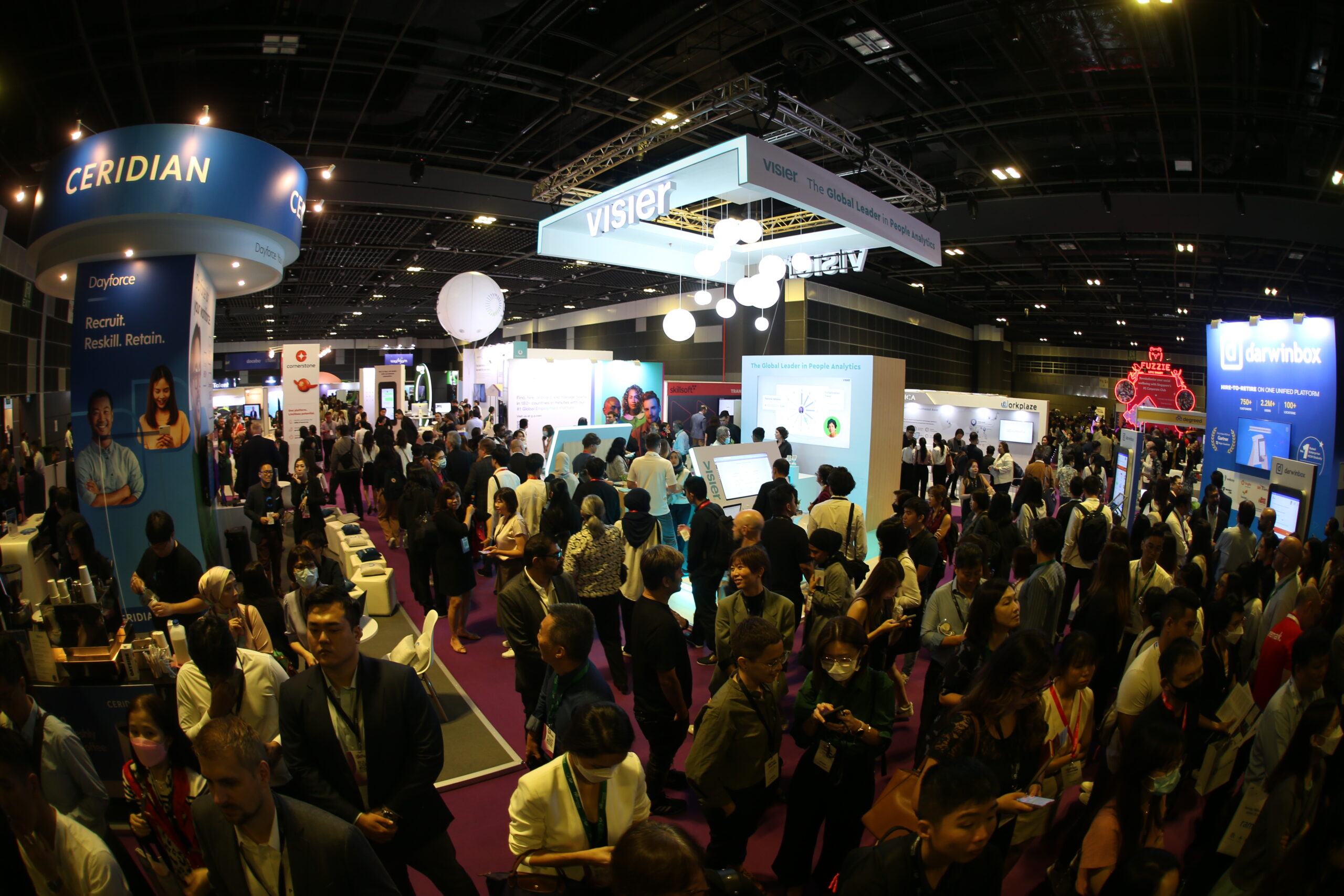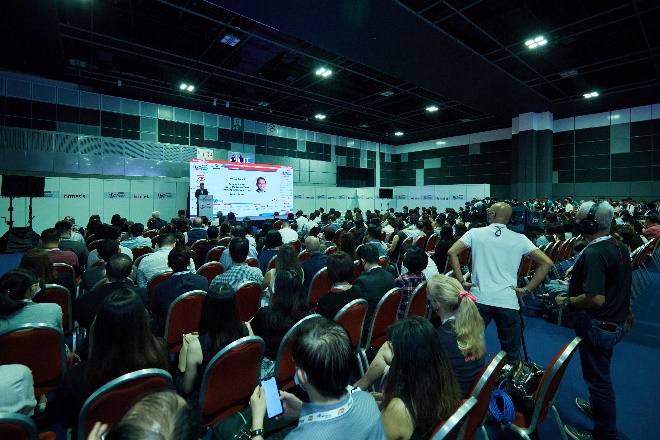HR Tech Festival Asia 2023: HR transformation in the future of work

As the evolving world of work continues to be accelerated by demographic changes and technological advancements, HR leaders and professionals must embrace the opportunities and challenges as they embark on a journey of transformation and change, said Zaqy Mohamad, Senior Minister of State, Ministry of Defence and Ministry of Manpower, Singapore.
In his opening address to officially open HR Tech Festival Asia 2023, SMS Zaqy added, “More than ever, businesses need HR to play a proactive role in addressing its talent needs to be competitive in the global arena. This requires having a strategic perspective and leadership mindset, underpinned by strong HR competencies and future-ready skills.”
That set the stage for a successful first day of Asia’s largest HR tech and workforce management event, HR Tech Festival Asia 2023. Under the theme Engage. Sustain. Thrive. Navigating the New Paradigms of People and Work, the two-day event featured the region’s top leaders to discuss the idea of what it means to become a full-fledged member of a working community, how they can live out these new philosophies every day and how to enjoy as much of a work-life balance as possible, and this was explored in full force with some of the panels and discussions on Day 1 of the festival. Held in Suntec City Convention Centre, the conference took time to discuss topics that relied on the next evolution of HR and its relevance to both employers and employees alike.
As the rapidly evolving HR tech marketplace continues to present new challenges and opportunities for organisations, industry leaders like Josh Bersin, Global Industry Analyst and CEO, The Josh Bersin Company, underscored the importance of leveraging emerging technologies like AI to simplify HR tools and enhance the employee experience. He said, “HR professionals must simplify and create a more integrated experience for employees. With AI, we have some incredibly important new tools to help us do that.”
The most transformative change in the HR market is AI, he declared. “AI systems process vast amounts of data and build statistical models to derive insights,” he explained, citing ChatGPT as one example of AI systems that are based on neural networks on the transformer architecture, and continued, “These models simulate how the human brain works and have reached a level of maturity where they scale almost linearly with the amount of data.” This means that AI systems can become smarter as more data is fed into them, making them a valuable tool for HR professionals seeking to streamline their processes and improve the employee experience.
Continuing the conversation on AI, Diana Wu David, Work Futurist and CEO, Future Proof Lab, delivered an exclusive keynote speech during the event. She took time to lead into a session where AI could potentially be a boon, starting off with the initial question on what could do with an extra day every week. “What if everyone had an extra day to explore and amplify their potential?” She mused. Quoting Lee Kai-Fu, Author of AI 2041 and Chair and CEO of Sinovation Ventures, Diana then led into the main idea that the introduction of AI would, “create efficient services that will give us back our most valuable resource-time,” and possibly give employees at least once a week to work on their skills and develop new aspects of their personalities.
As AI becomes increasingly prevalent in hiring, it is crucial for organisations to ensure that their processes are free from bias and provide equal opportunities to all candidates. Grant Meyers, Managing Director, Modern Hire APAC, discussed the responsible and ethical use of AI in talent acquisition and shared that the organisation has developed six core principles for ethical AI and algorithms to ensure that their software and assessments follow ethical guidelines. These principles include transparency, avoiding and reducing bias, respecting privacy, accountability to candidates and organisations, and upholding scientific standards.
Modern Hire has embedded these principles into all their interview technology products and innovations, including CognitIOn, a talent intelligence platform that drives research and innovation in measuring and understanding human performance. CognitIOn is built on the principles of industrial-organisational (I-O) psychology and leverages advanced AI techniques to analyse more than a billion candidate interactions, thus empowering organisations in making more efficient, effective, ethical, and engaging hiring decisions.
Paul Rubenstein, Chief People Officer, Visier, took his chance to share his expertise on data, and how that data analytics no longer is a niche aspect only used by HR executives. He showcased how organisations may be able to wield data analytics to help develop not just their employees but also their businesses. “What we need to understand is that people impact business,” he said and explained how usage of the data would help organisations bend the curve of attrition and drive accountability and encourage transparency and fairness.
Day 1 of HR Tech Festival Asia 2023 also hosted a panel discussion at the ASEAN Future of Work, which tackled the timely topic of flexible work arrangements (FWAs). Moderated by Terence Quek, CEO, Singapore Institute of Directors, the panel was composed of industry experts from diverse sectors, including Luis Lee, Regional Human Resources Director, Paradise Group; Noorfarahin bte Ahmad, Co-Chairperson, NTUC Women’s Committee, and Vice President, Amalgamated Union of Public Employees; Sherwin Siregar, Senior Vice President and Head of People Experience, Prudential Assurance Company Singapore; and Lai Li Fang, HR Sustainability Lead and Vice President, Group Human Resources, OCBC.
During the session, the panellists explored the growing trend of FWAs and shared effective strategies that accompany these plans. All the panellists agreed that the rise of FWAs was not a new one, but it was wholly embraced by parents who have to balance their jobs as well as their time with their children in the aftermath of the pandemic’s impact, especially working mothers who can come in to work early and then leave to pick up their children.
A key element brought up by Noorfarahin that the panellists agreed on was the importance of communication and trust between management and employees when it came to a successful implementation of the hybrid work arrangement. “The important thing (to take note of) is always back to the core values,” added Lai, naming that employees would often need to be driven by respect, responsibility, and integrity.
But how can organisations prioritise the human element in their talent development and culture transformation efforts? Dr Tanvi Gautam, HR Influencer, Keynote Speaker, Best Selling Author & Transformational Leadership Expert, LeaderShift Inc, attempts to address this by pointing out the three aspects of a human-centric workplace—energy, evolution, and execution. Energy refers to building the life force of an organisation, and at the heart of it is an authentic, nourished, thriving workplace, she said.
“The second aspect is the culture of evolution, which focuses on building adaptive capability through experimentation, strategic thinking, and taking risks,” she continued. Finally, Dr Gautham emphasised the importance of a culture of execution, which is built for aligned action through a set of deliberate values, behaviours and practices that create a sense of meaning, contribution, and community.
With ongoing skill shortages, organisations are facing challenges to produce talent at a pace that matches their growth. Roop Kaistha, Regional Managing Director, APAC, AMS, highlighted the importance of skill-based hiring and sourcing strategies, and said, “As organisations address the challenges of becoming skills-based, they should increase their overall level of maturity.”
As part of her recommendations, HR should understand and connect to wider organisational initiatives focused on skills, and form cross-functional teams between HR and the organisation to ensure alignment and focus. To enable and drive skills-based approaches, it is also necessary to understand which technologies are available to accelerate these efforts, and where change management and communication are needed to ensure adoption.
In today’s turbulent world, it is essential to understand how employee expectations have changed and how it impacts engagement and productivity. Shruti Jana, Vice President, Global People Partners and Organisational Effectiveness, Workday; and Wong Pei Woan, oCHRO and oCIO Solutions, Asia, Workday; addressed this issue and shared strategies on how deep insights throughout the employee lifecycle allow HR leaders to deliver better experiences to the individual.
They said that employee engagement is one of the fundamental pillars that define and help share the experiences of employees. Although it should not be the only, it is a major contributing factor to a positive employee experience.
A fireside chat between Helen Snowball, Chief People Officer, PropertyGuru; and Liliana Kellett, Sales Director, Culture Amp; discussed not just PropertyGuru’s multi-phase development from a start-up in 2007 to its entry in the New York Stock Exchange in 2022, but also its cultural transformation. When asked about what advice she would tell organisations to transform their culture, Snowball replied that the key is listening and adapting easily to what is happening as an organisation. “Remember that culture is our job, and it does evolve,” she explained. “Don’t hang on to something if it’s not working.”
Lastly, as a nod to HR, Snowball reminded the audience that a good organisation’s culture is not just HR’s responsibility. “We do play a big role,” she cautioned. “But culture is everyone’s responsibility.”
Champion AI/ML, embrace the creator economy, streamline processes, optimise employee experience, and improve workforce digital dexterity—these are the five key ingredients which Mike Bollinger, Global Vice President of Strategic Initiatives, Cornerstone, identified that will build new values to the organisation. Bollinger further delved into fostering an innovative mindset within the organisation and pointed out that innovation is not accidental but rather a practised and purposeful approach that requires intention and effort.
Day 1 of HR Tech Festival Asia 2023 came to a close with a closing keynote by R “Ray” Wang, Founder, Chairman and Principal Analyst, Constellation Research, Inc. In his speech, Wang gave his views on the rise of different cultural shifts and trends that have disrupted and shifted the way people work and live their lives, which culminates in the five key I’s—interest rates, inflation, inventory, infection, and invasion.
“We have to be sensitive to these forces as HR people,” he explained, citing anxieties like a shrinking middle class, the rise of AI automation, and the secret hopes to seek new role models as reasons that affect the way people work and think. “Massive disruptions are happening, some of which we cannot necessarily control, but some that we can work to understand,” he explained, saying that this examination into trends would help in “training the next generation of employees.”


